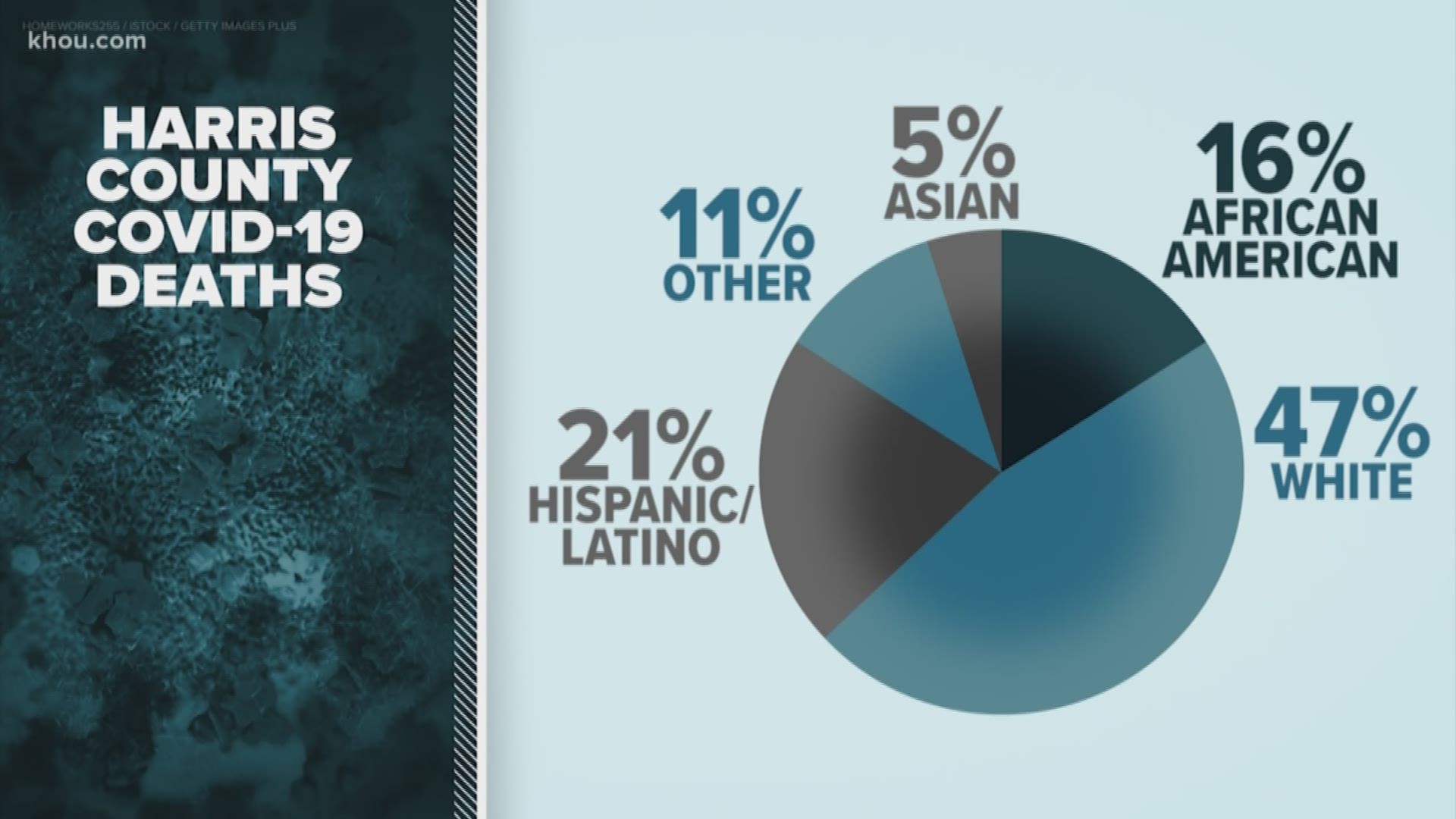HOUSTON, Texas — Across the country, reports claim that deaths from coronavirus are disproportionately impacting the black community.
In Houston and Harris County, experts say local numbers aren't mirroring that of other big cities that are seeing huge racial disparities. Still, they say, Houston isn't immune and it's something we need to watch.
A breakdown of COVID-19 deaths within Houston city limits shows 57% of fatal cases are African-American.
“We really need to get into these communities, communities of color, and do a lot more testing," Mayor Sylvester Turner said. "The testing has not been nearly as robust as I would’ve liked it."
But the numbers in Harris County, areas outside of Houston, tell a different story— of the county's 19 deaths, only three are African-American. That's about 16%.
"The numbers are very small, which is a wonderful story for Houston," Founding Director of the Kinder Institute for Urban Research Dr. Stephen Klineberg said.
He explained the big picture is not yet clear. There are differences on basis of race, but he said it's more so a class issue.
“[Race and class] both come together in such powerful ways," Klineberg said.
He said socioeconomic class affects everything: your health, your job, and even your access to care.
“It’s not because you're black. It’s because you’re poor that you’re more susceptible to these kinds of realities," Klineberg said.
We don’t yet have the numbers of positive cases broken down by race, but he believes there would be disparities there as well. He added low-income workers often have job tasks that put them more at risk.
“Vast majority of poor people are in personal services, they have to be there," Klineberg said.
When it comes to surviving the virus, highers rates of hypertension, diabetes and obesity within the African-American population may also be a factor.
“We have a long history of disparities when it comes to other diseases and outcomes," Director of Joint Center for Outcomes Research at Houston Methodist Dr. Bita Kash said.
Kash said these seem to play a role in surviving the virus. And while Houston's numbers are not as bad as some cities, she said it’s still early.
“We have not gone through our peak yet, so we need to be careful, this is our chance," Kash said.
Our chance, she says, to give especial care to those populations most at risk.
Other coronavirus headlines on KHOU.com
- Houston pop-up kitchen serving free meals to seniors, unemployed and others in need during coronavirus crisis
- 'Hectic' | It's been another unprecedented week for jobless claims as many hope for rapid recovery
- 'We were turned down' | 28 coronavirus cases at Missouri City nursing home after staff says county denied requests for widespread testing
- Houston relief fund giving up to $1,000 grants to local artists struggling due to COVID-19
- Texas is giving you a break on renewing your registration
Coronavirus symptoms
The symptoms of coronavirus can be similar to the flu or a bad cold. Symptoms include a fever, cough and shortness of breath, according to the Centers for Disease Control. Some patients also have nausea, headaches and stomach issues.
Most healthy people will have mild symptoms. A study of more than 72,000 patients by the Centers for Disease Control in China showed 80 percent of the cases there were mild.
But infections can cause pneumonia, severe acute respiratory syndrome, kidney failure and even death, according to the World Health Organization. Older people with underlying health conditions are most at risk for becoming seriously ill. However, U.S. experts are seeing a significant number of younger people being hospitalized, including some in ICU.
The CDC believes symptoms may appear anywhere from two to 14 days after being exposed.
Human coronaviruses are usually spread through...
- The air by coughing or sneezing
- Close personal contact, such as touching or shaking hands
- Touching an object or surface with the virus on it, then touching your mouth, nose or eyes before washing your hands.
Help stop the spread of coronavirus
- Stay home when you are sick.
- Eat and sleep separately from your family members
- Use different utensils and dishes
- Cover your cough or sneeze with your arm, not your hand.
- If you use a tissue, throw it in the trash.
- Follow social distancing
Lower your risk
- Wash your hands often with soap and water for at least 20 seconds. If soap and water are not available, use an alcohol-based hand sanitizer.
- Avoid touching your eyes, nose, and mouth with unwashed hands.
- Avoid close contact with people who are sick.
- Clean and disinfect frequently touched objects and surfaces.
- If you are 60 or over and have an underlying health condition such as cardiovascular disease, diabetes or respiratory illnesses like asthma or COPD, the World Health Organization advises you to try to avoid crowds or places where you might interact with people who are sick.
Get complete coverage of the coronavirus by texting 'FACTS' to 713-526-1111.

